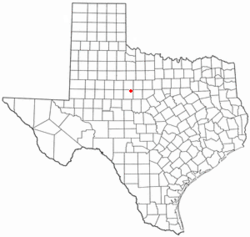Impact, Texas
| Impact, Texas | |
|---|---|
| Town | |
 Location of Impact, Texas |
|
 |
|
| Coordinates: 32°30′2″N 99°44′41″W / 32.50056°N 99.74472°WCoordinates: 32°30′2″N 99°44′41″W / 32.50056°N 99.74472°W | |
| Country | United States |
| State | Texas |
| County | Taylor |
| Area | |
| • Total | 0.1 sq mi (0.2 km2) |
| • Land | 0.1 sq mi (0.2 km2) |
| • Water | 0.0 sq mi (0.0 km2) |
| Elevation | 1,670 ft (509 m) |
| Population (2010) | |
| • Total | 35 |
| • Density | 350/sq mi (180/km2) |
| Time zone | Central (CST) (UTC-6) |
| • Summer (DST) | CDT (UTC-5) |
| ZIP code | 79603 |
| Area code(s) | 325 |
| FIPS code | 48-35816 |
| GNIS feature ID | 1388540 |
Impact is a village in Taylor County, Texas, United States. The population was 35 at the 2010 census. It is part of the Abilene, Texas Metropolitan Statistical Area.
Impact is located at 32°30′2″N 99°44′41″W / 32.50056°N 99.74472°W (32.500573, -99.744790).
According to the United States Census Bureau, the town has a total area of 0.1 square miles (0.2 km²), all of it land.
The area that became known as Impact began as a 20-acre (81,000 m2) poultry farm owned by advertising businessman Dallas Perkins. Prior to 1960, liquor sales were prohibited in all cities and counties surrounding Abilene. The prohibition of legal liquor sales encouraged bootleggers to produce illegal liquor commonly called "moonshine".
Perkins capitalized on the potential market for legal liquor among the wets by purchasing 27 acres of land adjacent to his farm on the outskirts of Abilene and then pushing for its incorporation. Calling the village "Impact" after his advertising business, 29 signatures of local residents were collected and it was incorporated in 1960.
Soon after, the village's citizens - consisting mostly of Perkins' family and friends - voted 18 to 2 to permit liquor sales. Abilene lawyers immediately filed motions to oppose the town's incorporation, but a Texas Supreme Court ruling in 1963 upheld Impact's incorporation and its right to sell liquor.
Two liquor stores opened in Impact in 1963. The first month's sales were $463,000 (equivalent to roughly $3.5 million in 2012). With the newfound revenues, the village's roads were paved and lighted, garbage pickup was introduced, and a policeman was hired. One of the liquor stores was Pinky's, which was owned by Perkins and his associates and used a logo of a pink elephant, thus the name.
...
Wikipedia
